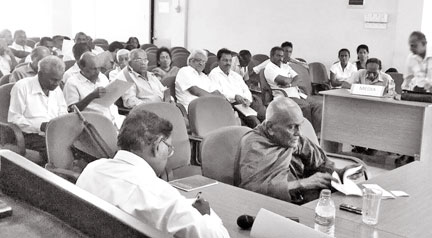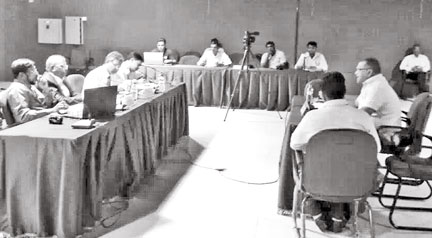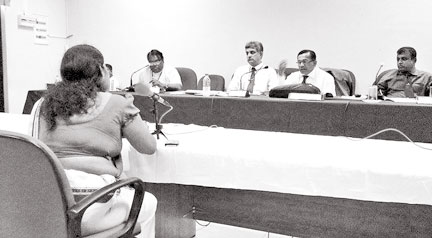Some imperatives in making a constitution
by Somapala Gunadheera
The government's effort to draft a new constitution appears to be
dragging its feet. With the resolution on framing a new constitution
getting postponed and re-fixed and a palpable indecision on the way to
go, an impression is being created in the public mind that the project
is still groping in the dark.
 |
| Public representation in
Badulla |
 |
Citizens make their
representations in constitution making.
Pix: Rights Now |
 |
| Public representation in
Kurunegala |
The first imperative in framing a constitution is to ascertain the
views of the public on the provisions to be included in the proposed
legislation. A committee has been set up to report on this aspect - and
it appears to be going about its task with enthusiasm and wide
publicity. It has drawn up a time table to visit all parts of the
country and ascertain the views of the people.
Consultation
The purpose of this survey ought to be to get a reliable idea on what
would please the majority of the people in the final product. But, can
the current survey make a dependable assessment on this point? The
initiative as structured can only produce a 'Pilgrim's Progress,'
detailing what individuals said to the reporters on their way. Such
hearsay information cannot guide the framers of a constitution through
the pitfalls on the way to their destination.
The framers need reliable information on the issues involved, such as
their relative importance, ratios and proportions of public support,
optimum alternatives and what would be sustainable in the long run.
That is a job calling for resort to a scientific statistical survey.
Such technology and expertise is readily available locally, and it is a
pity that this resource does not appear to have been tapped so far. It
is still not too late to commission such a survey to enable the framers
to select their alternatives on firm ground.
The survey report will disclose the total picture of the background
to the framing. It will identify areas where a consensus has to be built
to minimise controversies that might crop up in due course. Building
consensus calls for a representative body consisting of the interests
involved in the final product.The committee appointed to ascertain the
views of the public has decided on second thoughts, to extend its time
table to enable it to consult the stakeholders, the racial and religious
groups and so on. Theirs' cannot be a 'thus have I heard' report. It
calls for a deep knowledge of the rifts and divisions which can only be
sorted out after a scientific survey. It involves selection of the
parties to be consulted and calls for a forum at which the stakeholders
can sit and reach consensus after intimate discussion.
The consultative committee is an integral part of the drafting
process. It has to be constituted with care and responsibility. The
views of the members of the committee play a vital role. They cannot be
identified on the phone or by ringing door bells. The need is to
ascertain the consensus on knotty issues thrown up by the survey through
a collective effort. The part to be played by the representative
committee is more than half the job.
It calls for full participation of the respective opinion leaders and
tact and foresight in handling it.
The next step is the framing of the draft constitution based on the
annotated survey. That calls for a panel of outstanding draughtspersons,
well versed in constitutional law. Fortunately, this country can boast
of several such experts with international exposure and on the job
experience. They may have their own political views, but as
professionals, they can be trusted to produce a state-of-the-art draft.
The draft constitution is then sent to Parliament for due
promulgation. As the draft is based on consensus and as Parliament
should be necessarily representative of the parties that came to that
consensus, the document should normally have an easy passage through the
House. But in actual practice, there can be attempts to tinker with the
provisions to serve personal interests.
According to the book, an MP is elected to Parliament to represent
the people who elected him. It is in his personal interest to stand by
their interests, if he wants to get himself re-elected. Nevertheless
there can be instances in which an MP's personal interest can come in
conflict with the public interest. Creating portfolios is one example.
People's interest demands that the country is governed by the minimum
number of ministers, conserving public funds. Such limitation would be
inimical to an individual member's thirst for power. We have often
witnessed how legislators subjugate public interest to their personal
ambitions in such situations.
A referendum
Yet another instance where MPs go beyond their mandates is in
crossovers, claiming the 'excuse of conscience.' As representatives of
the people, they can only stand by the conscience of the people.
If they are unable to do so for personal reasons, they should stand
down, making way for their electorate to replace them with others who
are prepared to abide by the representative character of their role.
Undoubtedly, judicial admission of an MP's right to stand by his alleged
conscience has been the cause of many an upheaval in Parliament, ending
in the creation of a dictatorship.
In the ultimate analysis, all constitutions after independence were
tainted by the self-interest of the political party in power. Winners at
each election, imposed a new constitution on the people, heralding it as
a showpiece of democracy, only for the document to be torn up by their
successors as a tool of mis-governance.
Time has come to put an end to this vicious circle by putting in
place a constitution that would stand the ravages of self-interest. That
requires a taboo on tinkering with a constitution that has been
democratically evolved.
Any amendment that Parliament wishes to make to the document built by
consensus of all stakeholders should be subject to the wish of the
people, ascertained at a referendum.
There does not appear to be a hurry to enact a new constitution
immediately. Both major elections are years ahead. That gives the
government enough time to go through the essential imperatives on
constitution-making methodically, at leisure and produce a model in due
time.
From the strategic point of view too, it could be risky to call for a
division on a piece of legislation that has the potential to trigger a
crisis in the midst of an inter-party tussle for power. |

